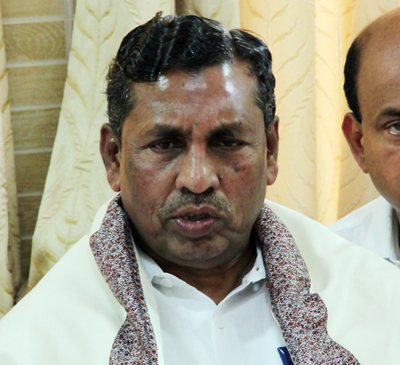
Mangalore, October 15: Certain technical problems are causing a delay in starting Mangalore-Shravanabelagola train services and hence a request has been placed before Chief Minister Jagadish Shettar to make necessary clearances, K H Muniyappa, Union Minister of State for Railways, said.
Speaking to mediapersons in Mangalore on Monday, Mr. Muniyappa said that although land acquisition problems at Nelamangala and Kunigal have been sorted out with regard to starting of the Mangalore-Bangalore-Shravanabelagola train service, there are still some technical problems causing delay in its initiation. It has been brought to the notice of the Chief Minister and he may give the necessary clearances soon, he said.
Responding to a query on laying of train tracks between Hubli and Ankola, Mr. Muniyappa said that the Environment and Widllife departments have certain objections to the project but there are chances of it getting a green signal as Indian Institute of Science has in a report submitted to them three months ago stated that deforestation for the purpose can be reduced and more tunnels can be implemented.
The Minister said that plans of developing Mangalore station as a world class station are in the pipeline but lack of land is acting as a major hindrance in this regard. “The concept is that passengers must have all facilities available to them at the station. It will encompass commercial complex, rest rooms and other such facilities. But land requirements are issues as minimum of five acres are needed for the purpose”, he said.
Speaking about Sonia Gandhi's scheduled visit to Mangalore on October 18, Mr. Muniyappa said that the UPA government has as per the vision of Ms. Gandhi introduced several projects for the benefit of the people under 'Bharat Nirmaan' project but the state government has been taking all the credit. The centre is ever willing to cooperate with the state and is ready to accept proposals by the state government to solve the drinking water problem, he said.
Earlier, Mr. Muniyappa, along with KPCC President Dr. G Parameshwar and other Congress leaders visited Nehru Maidan where preparations for the Sonia Gandhi programme are taking place in full swing.
Speaking to mediapersons on the occasion, Mr. Parameshwar said that the convention will help give momentum to the Congress party going into elections in the region.
On the Kaveri issue, Mr. Parameshwar said that the KPCC will form a team itself to carry out a study on the issue and the water needs of the states of Karnataka and Tamil Nadu and submit the same to the government.
















Comments
Add new comment